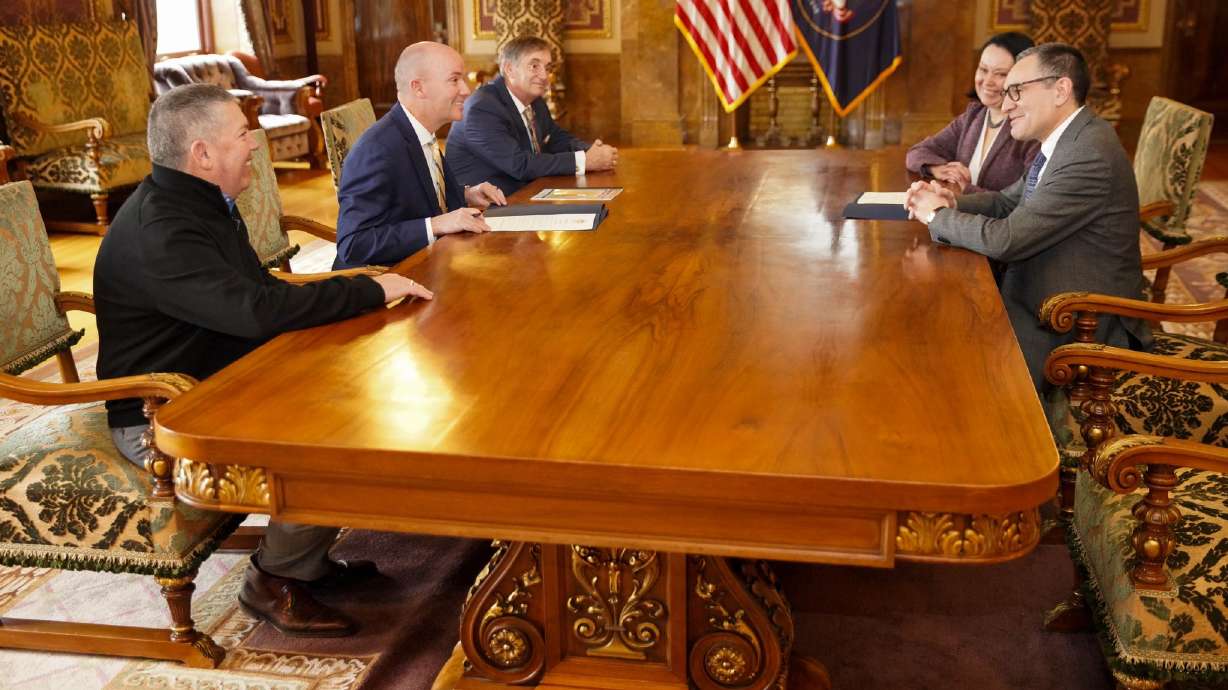Estimated read time: 4-5 minutes
This archived news story is available only for your personal, non-commercial use. Information in the story may be outdated or superseded by additional information. Reading or replaying the story in its archived form does not constitute a republication of the story.
SALT LAKE CITY — José V. Borjón is leaving the Beehive State after a five-year stint as the consul general of the Consulate of Mexico in Salt Lake City.
Borjón leaves for a new assignment in Poland this weekend. He will be replaced by Eduardo Baca Cuenca, whose experience includes representing the Mexican government in Trinidad and Tobago, Venezuela, Seattle and Kuwait. Baca is expected to start in Salt Lake City by the end of December.
"It's been a wonderful experience. I feel satisfied with what I've been working on, the team and how the consulate has been a critical actor in supporting the not only Mexican community but also being a voice for Hispanics and Latinos in the state of Utah," Borjón said.
Mexico has the largest network of consulates in the world and is the only government with an official consulate in Utah (about two dozen other countries, ranging from Peru to Morocco, do have honorary consuls in the state).
Borjón's 24-year career as a diplomat has included assignments in South Korea; Washington, D.C. and Houston — but he said Utah has been unique.
"It's been very special," he said. "Utah is unique for many reasons, obviously its history, the importance of faith and of The Church of Jesus Christ of Latter-day Saints. But also it has had a tradition of open attitude toward immigrants, (such as) many of the changes in the Legislature like driving privileges and giving the possibility for undocumented students to pay tuition as Utah residents, so it's unique. It's been a very good experience and I think very different than any other city in the U.S."
He added that one of his favorite memories from his time in Utah was participating in the Days of '47 Parade.
"I always thought that it was important to have a Mexican, Mexican-American presence in the parade to remind people that Utah was historically a territory that was part of the Mexican nation and we were here then and now as well," he said.

Borjón has also increased the visibility of the Mexican community by pushing for collaboration with nonprofits, the arts, local governments and faith organizations.
His tenure in Utah, however, has not been without difficulty. Borjón and the consulate helped community members navigate the COVID-19 pandemic, including hosting vaccination clinics and working with local governments to connect Latinos with resources. Borjón said the consulate also helped the community address anti-immigrant sentiments during the Trump administration.
"It was important to become active as a voice on the local importance of the Mexican immigrant community and how we are contributing to the welfare and prosperity of this state," he said. "Regardless of what was happening in Washington, we wanted people to get along and continue being part of their different communities. And I got good feedback overall, regardless of political affiliation or ideology.'"
Honored to visit @GovCox to give my farewell and thanks for the great partnership the state of Utah has had with Mexico and our community. pic.twitter.com/mov0xz9wvB
— José V. Borjón 🥑 (@joseborjon) December 7, 2022
Borjón is also proud of the work the consulate has done to protect Mexicans and Mexican-Americans in Utah, such as working with other organizations to help pass a hate crime bill in 2019 — a law that was motivated in large part by an attack on a teen of Mexican descent — and more recently on the extradition of a man accused of killing local Latina radio host Gaby Ramos.
"Beyond the high visibility cases — it's every day. This consulate receives an average of 100 to 120 persons a day," he said. "We try to help the community case by case."
That work includes a large number of visas because of the number of missionaries with The Church of Jesus Christ of Latter-day Saints who serve in Mexico and a growing number of Americans wanting to retire in Mexico.
Utah has been good to Borjón and his family, including his daughters who range from ages 10 to 15, he added.
"Overall we've always felt welcomed by all, from our neighbors to institutions and organizations and members of different faiths. That's very unique, I would say of Utah, how people are very open and welcoming," he said. "The people are what make the difference in the state, and that's certainly what I'm going to miss.
"I was very comfortable here as consul and just amazed at how hardworking our community is and the solidarity between them. I'm really going to miss it."









